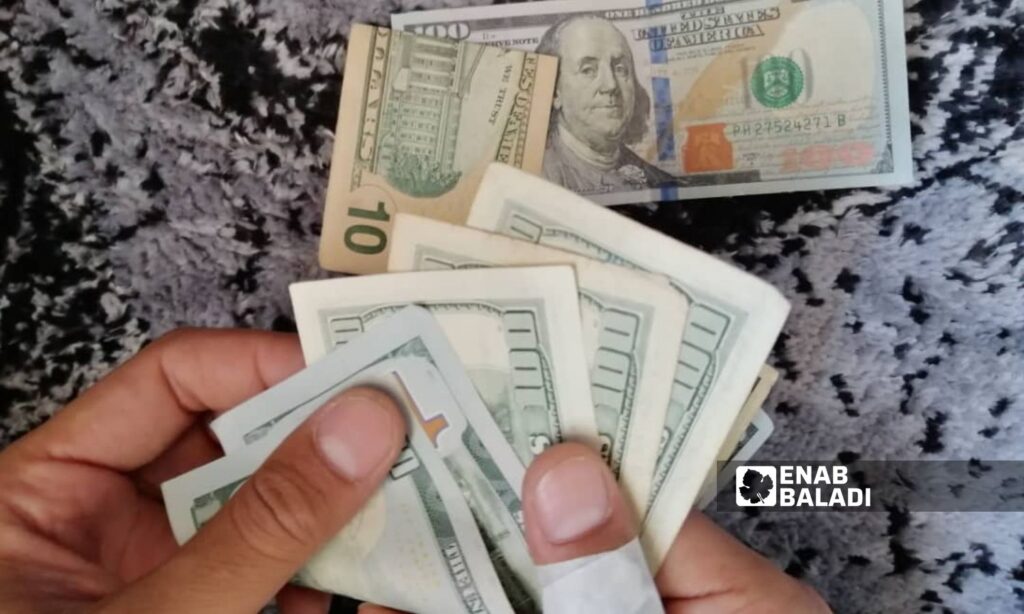Deir Ezzor – Obadah al-Sheikh
Deir Ezzor and its countryside, within areas controlled by the regime or the Autonomous Administration of North and East Syria (AANES), are witnessing the spread of counterfeit $100 bills. Victims of the forgery report that the source of these bills is the regime-controlled areas, and most victims are those who receive remittances from abroad.
Several residents of eastern rural Deir Ezzor, where the Autonomous Administration controls, have complained of falling into the counterfeit currency trap since early July.
Ahmed Nawara, a resident of al-Joura neighborhood in Deir Ezzor city under regime control, said he was a victim of forgery through an unlicensed money transfer office.
He told Enab Baladi that one of the representatives of the transfer offices handed him a remittance of $400 in one of the streets of Deir Ezzor. As usual, the money delivery was done quickly, fearing government surveillance that criminalizes dealing in foreign currencies in Syria.
After verifying the amount, the representative got on his motorcycle and left quickly without revealing his name or the name of the money transfer company he worked for.
About a week later, Nawara went to the Autonomous Administration areas east of the Euphrates River. While at a currency exchange shop in the village of Hawayij Dhiab, he discovered that the entire amount he had was counterfeit.
Nawara feared being accused of currency forgery then, so he called the phone number on the remittance notice, but the responder told him he would report him to the Military Security branch for dealing in foreign currencies if he tried to contact him again.
As a result of the threat, Nawara gave up his right to reclaim the amount, fearing to be implicated in such a problem.
In January, the regime issued Decrees “5” and “6,” specifying penalties for dealings in non-Syrian pound currencies, unlicensed exchange operations, and transferring foreign currencies outside Syria.
Decree “5” for 2024 reaffirmed the previous ban on dealing in currencies other than the Syrian pound for payments or any commercial transactions, maintaining imprisonment or jail sentences.
A widespread phenomenon in markets
Farhan al-Aliyan, a clothing merchant in the town of Darnaj in northern rural Deir Ezzor, told Enab Baladi that counterfeit currency circulation extended to shop owners and customers on a large scale.
He added that about a week ago, a woman in her forties from the regime-controlled city of al-Asharah brought him a counterfeit $100 bill. When asked about its source, she said she received it from a money transfer office from her son living in Germany.
Al-Aliyan noted that the counterfeit bills are being recirculated instead of destroyed, especially since those holding them can’t compensate for their loss. Some people trade them for less than half their value, especially among the oil sector employees in the Autonomous Administration, who conceal them within large sums, making them hard to detect manually.
Saleh al-Aliyan, head of the money changers union in the Autonomous Administration controlled areas of rural Deir Ezzor, told Enab Baladi that the spread of counterfeit dollars in exchange offices and markets is a relatively new phenomenon, noting that some of these currencies are hard to detect manually.
He added that local money changers catch counterfeit currencies almost daily, some with forgery quality reaching up to 90%, making them difficult to identify.
Abdullah al-Attiyah, a trader of sanitary materials in eastern Deir Ezzor, told Enab Baladi that some traders believe that buying goods worth $30 or $40 makes it easier to pass counterfeit bills and deceive shop owners. However, the talk about the spread of counterfeit currencies pushed merchants to check any currency they receive from customers.
Remittances: A lifeline for Syrians
Financial remittances are a lifeline for most Syrians today amidst low wages and salaries, and continued price increases driven by rising inflation levels and the devaluation of the Syrian pound against foreign currencies.
Nearly 90% of Syrians live below the poverty line, and more than 15.3 million people need humanitarian assistance.
Most Syrians resort to remittances through unknown companies and intermediaries since they deliver remittances at the black market rate, which reaches 14,000 Syrian pounds per dollar.
When remittances are sent through official channels, they reach at the official exchange rate, not exceeding 12,700 Syrian pounds, so the difference makes most prefer to send through companies and intermediaries, a method considered not entirely safe.
A drawback to this method is that the money often comes incomplete. Also, the delivery method in the street or at the entrance of an abandoned building is somewhat dangerous, usually taking place in the evening. The greatest fear is surveillance. If the receiver and the deliverer are caught, their fate will likely be grim.











